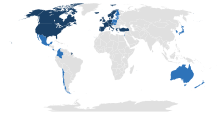Japanese adults rank high in literacy and numeracy in OECD survey
Wednesday, October 9, 2013

Image: Canuckguy and Emuzesto.
Yesterday, the Organisation for Economic Co-operation and Development (OECD), a 34 member international economic organization founded in 1961 that traces its origins back to the World War II-era Marshall Plan, published results on the state of adult skills in 24 countries, most of them European. Compared to other countries surveyed, Japan ranks as one of the best-performing surveyed countries in both literacy and numeracy.
Internationally, Japan ranks first amongst surveyed countries for literacy proficiency amongst adults. At the highest proficiency level, level 5, Japan is tied with Sweden and ranks as the fourth highest percentage of surveyed nations at 1.2%. Only Finland, at 2.2%, and Australia and the Netherlands, at 1.3%, are higher. Readers at this level synthesize text, compare and contrast ideas and points of view, and process information across multiple sources. Japan has one of the smallest percentages, at 4.3%, of their population at reading proficiency level 1. This means adults have a basic understanding of what they read, can fill out forms and can understanding the meaning of sentences. Amongst young adults aged 16 to 24 years, Japan ranks first amongst surveyed countries, with a mean score comparable to Finland.
Japan ranks first amongst all surveyed countries in numeracy proficiency amongst adults aged 16 to 65 years. When only people aged 16 to 24 years are looked at, Japan finishes third amongst surveyed nations with an average score comparable to Austria, the Czech Republic, Estonia, Finland, South Korea, the Netherlands, Slovakia, Sweden, and the Flanders region of Belgium.
The correlation between individual performance on numeracy and literacy tests in Japan of 0.846 is below the surveyed average of 0.867.
In proficiency at problem solving, Japan finishes tenth amongst surveyed nations. Adults were allowed to opt out of using computers for this test, and Japan had the third largest percentage at 15.9% opting to do so.
The Japanese data said adult literacy skills did not impact on social inequality, and that literacy is not a barrier to social mobility. This contrasts to other countries like the United States where literacy skills correlate to social mobility.
The percentage of adults who have completed university in Japan is above the global average, particularly for people aged 25 to 34 years. Japan is also below the global average in terms of the percentage of the population who have not finished high school. Japan finishes in the middle of surveyed countries based on reading skills required at work.
The results are based on a survey of 166,000 adults from Australia, Austria, Flanders, Canada, the Czech Republic, Denmark, Estonia, Finland, France, Germany, Ireland, Italy, Japan, South Korea, the Netherlands, Norway, Poland, Slovakia, Spain, Sweden, England, Northern Ireland, the United States, Cyprus, and Russia. They survey was conducted from August 2011 to March 2012, with the exceptions of Canada where data was collected from November 2011 to June 2012, and France from September to November 2012.
Sources
- "OECD Skills Outlook 2013, First results from the survey of adult skills" — Organisation for Economic Co-operation and Development, October 8, 2013
- "History of the OECD" — Organisation for Economic Co-operation and Development, October 8, 2013 (date of access)




